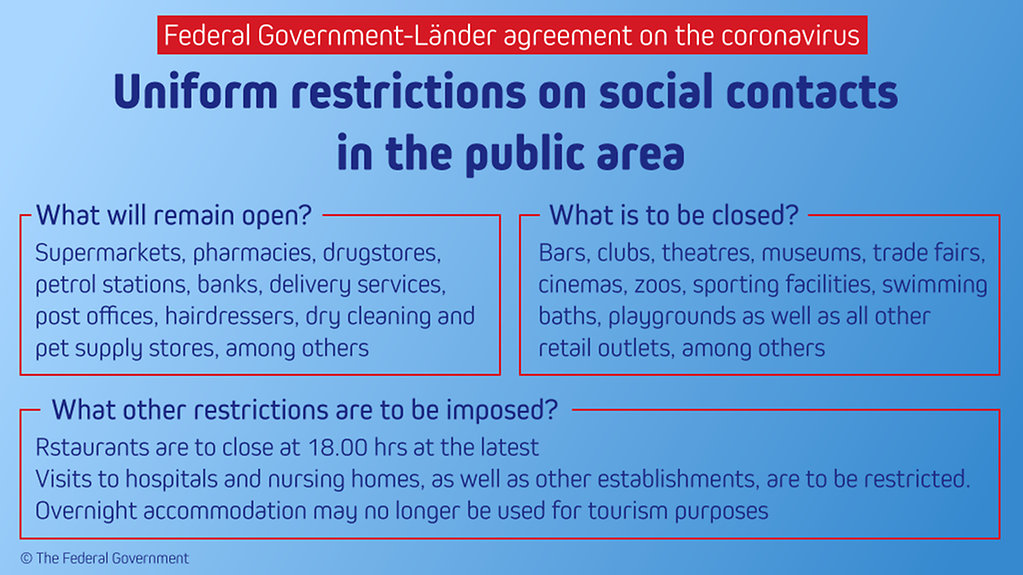Agreement
On 16 March 2020, the Federal Government and the Minister-Presidents of the Länder agreed on the following guidelines on a uniform approach aimed at further limiting social contacts in the public area in the light of the coronavirus epidemic in Germany:
2 min reading time
I. Food retail outlets, weekly markets, collection and delivery services, beverage shops, pharmacies, medical supply stores, drugstores, petrol stations, banks and savings banks, post offices, hairdressers, dry cleaners, launderettes, newsagents, DIY stores, garden centres, pet supply shops as well as wholesalers will NOT be closed. Rather, the ban on Sunday trading for these sectors should be lifted for the foreseeable future. Shops and stores of this nature are to remain open under certain conditions regarding hygiene, control of access and the avoidance of queues. Service providers and tradespeople can continue to work. All healthcare facilities will remain open under stricter hygienic conditions.

Uniform restrictions on social contacts in the public area.
Photo: Bundesregierung
II. Bars, clubs, discos, pubs and similar establishments – theatres, opera houses, concert halls, museums and similar establishments – trade fairs, exhibitions, cinemas, theme parks, zoos and providers of leisure activities (both indoor and outdoor), specialised markets, amusement arcades, casinos, betting shops and similar establishments – premises used for the purposes of prostitution, brothels and similar establishments – sport in all public and private venues, swimming baths and adventure pools, gyms and similar establishments – all other retail outlets not specified here, in particular outlet centres – playgrounds are all to be closed to the public.
III. Gatherings in clubs and other sporting and leisure facilities, lessons and courses in adult education centres, music schools and other public and private educational establishments in the non‑formal education sphere and coach tours – gatherings in churches, mosques, synagogues as well as gatherings of other religious communities are to be banned.
IV. Regulations are to be issued regarding visiting hours in hospitals, care and rehabilitation centres, nursing homes and special types of housing as defined in Book IX of the Social Code and similar establishments in order to restrict visits (e.g. one visit per day, for one hour, but no children under the age of 16, no visitors with respiratory infections, etc.). Persons who during the last 14 days have been in risk areas abroad or areas within Germany classified by the Robert Koch Institute as being particularly affected are to be banned from entering the aforementioned establishments as well as – insofar as they are not completely closed – universities, schools and kindergartens. Conditions are to be imposed on canteens, restaurants, other establishments serving food and hotels with the aim of minimising the spread of the coronavirus. These will include regulations on the space between tables as well as the number of guests, hygiene measures and notices, regulations to the effect that overnight accommodation in Germany can only be used for essential and expressly not for tourism purposes, as well as regulations stipulating that restaurants and other establishments serving food cannot open before 6.00 hrs and must close at 18.00 hrs at the latest.